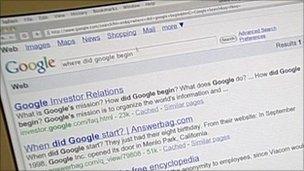Google faces new complaint in anti-trust probe
- Published

Google faces more questions over how it dealt with other search engines
A new complaint about Google's alleged anti-competitive behaviour has been filed by specialist French search engine 1plusV.
It follows similar complaints from price comparison site Foundem and legal search engine ejustice.fr last year.
Those triggered a European Commission probe into Google's business practices, which is ongoing.
Google said it was working with the EC, adding that there "was always room for improvement".
"We have been working closely with the European Commission to explain many different parts of our business. While we have always tried to do the right thing for our users and advertisers, we recognise that there's always room for improvement," the firm said in a statement.
Delisted sites
1plusV is the parent company of of eJustice.fr and runs so-called vertical search engines that specialise in law, music and culture.
It said that between 2006 and 2010 Google prevented vertical search firms from using its online advertising service AdSense.
"This is the only truly effective way of obtaining targeted advertising on a search engine," 1plusV said in a statement.
It also alleges that, in the weeks following the original complaint, Google delisted sites published by it.
"For eJustice.fr, Google's decision to remove it from its search results was catastrophic in terms of its traffic," it said.
Google has said that ranking on its search results depends on how valuable a given site is for its users.
It has told companies to improve their websites to help move them up the rankings.
But 1plusV said that eJustice.fr was relisted in December, without modification.
"The relisting is in complete contradiction with the Google argument that eJustice.fr was delisted because it provided no value to the internet user," 1plusV said.
The European Commission said it would give Google the opportunity to comment on the allegations before deciding what action to take.
If Google is found guilty of abusing its dominant position in the search or advertising markets it could face a hefty fine.
- Published16 February 2011
- Published2 February 2011
- Published14 December 2010
- Published30 November 2010